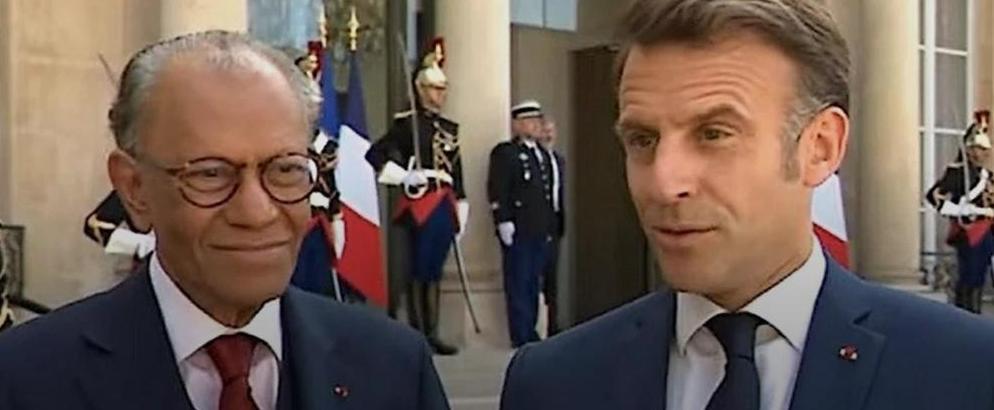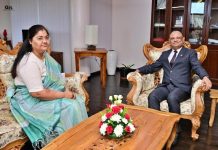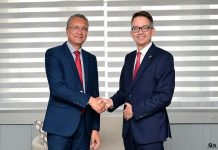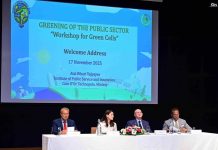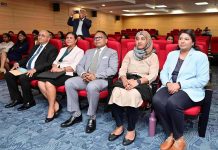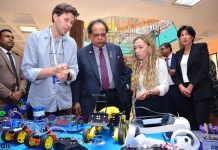Africa-Press – Mauritius. Energy, Water, AI, and Education: Paris and Port Louis Strengthen a Strategic Partnership in the Indo-Pacific
Thirty-five years after François Mitterrand’s visit in June 1990, Emmanuel Macron will undertake an official visit to Mauritius on 20–21 November at the invitation of Prime Minister Navin Ramgoolam. The French head of state will arrive on the afternoon of 20 November for a roughly 24-hour stay before continuing his diplomatic tour to South Africa—where he will attend the G20 Summit—followed by stops in Gabon and Angola. This visit fulfills a commitment made after the cancellation of an April trip, which was postponed following the death of Pope Francis.
According to Frédéric Bontems, France’s Ambassador to Mauritius, who addressed the press last Friday, relations between Paris and Port Louis have “never been so dense.” This year, the two leaders will meet for the fourth time, following prior exchanges in Madagascar in March, in Nice in June during the Ocean Conference, and at the Élysée Palace. This regular engagement reflects the high degree of political trust between the two capitals. Both Mauritian authorities and the French Embassy are intensifying preparations for a visit marked by several events with significant economic, strategic, and symbolic impact.
A Tight and High-Level Diplomatic Agenda
The official program includes a courtesy visit to the President of the Republic of Mauritius, Dharam Gokhool, followed by a one-on-one meeting between Emmanuel Macron and Navin Ramgoolam, and a State dinner. The French President will also attend an event on e-sports and emerging technologies at the Caudan Waterfront, visit the Plastic Odyssey vessel—dedicated to combating plastic pollution—and the Champlain ship. A meeting with the business community is scheduled, along with a tree-planting ceremony at the Pamplemousses Botanical Garden. Macron will also inaugurate the project for the new French Embassy in Telfair. A joint declaration with the Mauritian Prime Minister is planned before the President’s departure.
Economically, the Ambassador underscored that France remains Mauritius’s top customer, importing around €250 million in Mauritian goods annually, and its fifth-largest supplier, exporting approximately €450 million. French tourism contributes 400,000–450,000 visitors per year. France is also the largest foreign investor in the island, with a resident French community estimated at 15,000–18,000 individuals.
Three core pillars will shape the presidential visit: education and the Francophonie; digital technology and artificial intelligence; and energy transition and water management. In education, a pilot project will introduce partial teaching of mathematics or science in French in public schools, while an agreement between higher education authorities will facilitate student mobility.
The digital component will center on the “Génération IA – Mauritius IA” forum at the Caudan Arts Centre, with Mauritius currently chairing the Francophone Network of Data Protection Authorities.
On energy and water, France will support the modernization of Mauritius’s electricity grid—notably through an agreement between EDF and the Central Electricity Board (CEB) to reinforce infrastructure, integrate solar power, develop smart grids, and reduce transmission losses. EDF Réunion will help strengthen inter-island cooperation. A separate French-supported initiative aims to make Rodrigues Island a regional model for renewable energy.
Laetitia Habchi, Director of the French Development Agency (AFD), reported that over €600 million has been committed over the past four years: €300 million during the pandemic, €200 million in 2023 for water-sector reform, €80 million for modernizing the public banking sector, and a €100 million loan (plus €20 million in grants) earmarked for 2025.
Five Cooperation Agreements and an Enhanced Partnership
In line with decisions made by the Mauritian Council of Ministers on 14 November, several agreements will be signed during the visit. These cover cooperation in the blue economy; energy transition; sustainable water management; integration of renewable energies via the FEXTE mechanism (involving the Mauritian government, AFD, and EDF); and the development of bilingual French-language education within the national system.
The water-sector cooperation will mobilize €200 million in support, supplemented by a €2 million grant, aligned with Mauritius’s 2025–2029 Government Programme and its national “Marshall Plan for Water.” France will also back the energy transition toward 60% renewable energy by 2035, contributing a €100 million AFD investment program and €20 million from the European Union. From December onward, EDF Réunion will help enhance the security of the electricity grid.
The AFD will also participate in the Génération M.IA Forum, focusing on AI applications in water and energy management. The ICC-COI project will support youth initiatives, including an all-female e-sports team competing in a tournament and video-production workshops at the IA4Good festival.
Asked about the Tromelin issue, Ambassador Frédéric Bontems noted that “it is uncertain whether discussions will reach a conclusion at this stage… progress must be made cautiously.” This visit marks a pivotal moment in bilateral relations—characterized by unprecedented political, economic, and strategic intensity—and reaffirms Mauritius’s role as a key French partner in the Indo-Pacific region.
For More News And Analysis About Mauritius Follow Africa-Press


